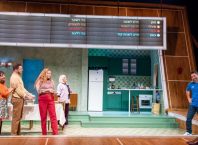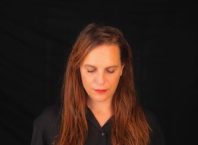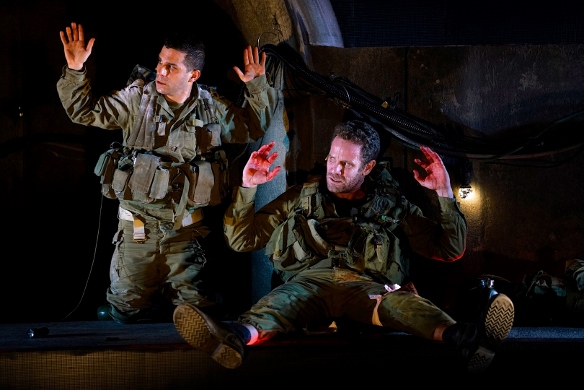
Is there light at the end of the tunnel? That is the question posed by Gesher Theatre’s new production, the riveting and profoundly moving satire In The Tunnel. Clever, fast-paced, and hard-hitting, the play merges exuberantly uninhibited fun with astute social critique, political satire, and outstanding performances. Written by Roee Chen, inspired by Danis Tanović’s film No Man’s Land, and directed by Irad Rubinstein, it focuses on two Israeli soldiers trapped in a tunnel with two Palestinian soldiers, a painfully apt metaphor for the political situation.
Will they escape? Will they survive? According to Gesher, it is we, the audience, who determine the ending of the play. Audience members can vote either “Yes, there is light at the end of the tunnel,” and an optimistic outcome, or “No, there is no light at the end of the tunnel.” Whatever choice we make, even if we choose not to vote, this experience begins with a choice, an action. We are in this.
The immersive quality of the show continues as one enters the hall, confronted by a news ticker flashing military-style messages instantly familiar to anyone who has even a passing acquaintance with the IDF. Audience – improve your appearance! ‘Difficult’ is only for the opera. Audience members caught texting will get one hour’s detention after the show. Audience members taking pictures will stay Shabbat. And yes, it all sounds better in Hebrew.
The action is intense, and within seconds one is plunged in a war zone. Drawing on the suspense of a classic dramatic situation, the over-zealous young soldier Tzlil (Ido Moseri) and seasoned soldier on his last day of reserve duty Iftach (Miki Leon), find themselves in close quarters with the enemy. Michael Kramenko’s set design is dynamic, visually compelling, and, in tandem with the lighting by Avi Yona Bueno (Bambi), an integral part of the performance. The stage is split into three levels. The lower level is realistically designed as a segment of a tunnel, with its concrete walls, low ceilings, and cables.
Above, is the rest of the world, an open space that represents different locations at different times in the show. Between these two is the news ticker, which runs non-stop throughout the show, much like the mass media virtual IV we have come to depend on 24/7, streaming advertisements and news flashes. The lighting takes the viewers from one scene to another, the pace in time with events, accelerating and heightening the tension, or offering a respite.
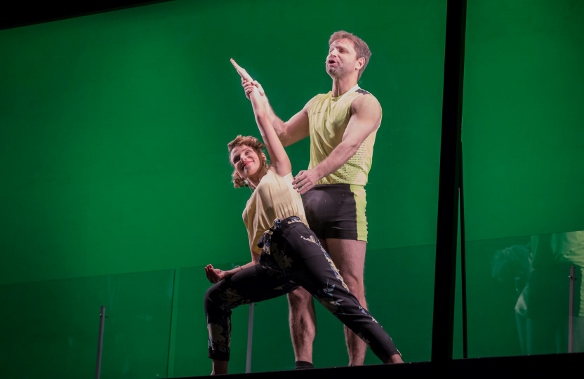
Breathe! The beautiful morning TV show host Karnit (Karin Serrouya) and her well-endowed guest Ricardo (Paulo Moura), intone, as they encourage viewers to flex their spiritual muscles and drink the trendy juice of the moment. Embodying an era when life has been superseded by lifestyle, one might be tempted to say that these two are caricatures, were they not such precisely accurate depictions. When the situation in the tunnels erupts, the media is called to action, and Karnit steps up, as well as ‘prominent figures’ from the Israeli (Alexander Senderovich) and Palestinian (Yuval Yanai) leadership. A life or death battle may be seething below, but on the surface, everyone is working hard to look good, seeking popularity with a side order of inner peace. It’s a scathing and comic indictment of mass media, politics and the nefarious relationship between them.
In The Tunnel is hilarious, outrageous, and precise in its send-up of an era in which all standards of morality and quality have fallen into a sickening relativism in which there is nothing good or bad, but rating makes it so. Roee Chen makes exquisite comic use of the speech patterns and mannerisms of the different members of Israeli society, always on target; one laughs until it hurts.
Often in political theatre, the second term is neglected in the passion of the first. Not so with Gesher’s In The Tunnel. The strength of this play is in its magnificent theatrical expression, with all elements working together to create an experience. Even if one disagrees vehemently with its politics, it is undeniably a great work of theatre. Does it make you angry? Good! Theatre at its best, invites and provokes thought and emotion, while entertaining – In The Tunnel does it all.
The tense situation within the tunnel, and the reality it references, is balanced by the humor – visual, verbal, and physical, which releases the tension. Within the wild satire, Rubinstein elicits from the actors a performance that maintains a fine distinction between deep emotion and sentimentality. One is drawn in to the characters, becoming involved in their tense situation, then surprised into laughter and the tension dissipates, only to build up once more.
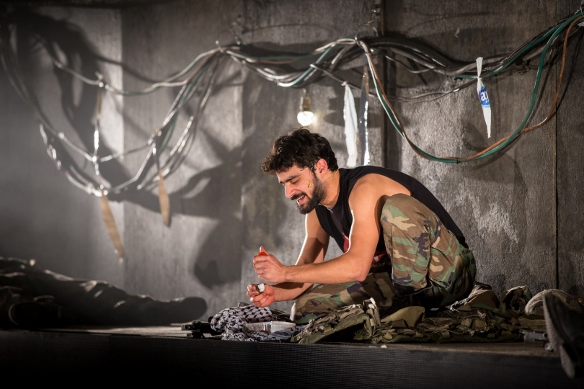
What happens when one is trapped in close quarters with the enemy? Suddenly, the enemy has a face and a name: Mansur (Yuval Yanai) and Hisam (Piras Nassar). The entire ensemble of actors deliver outstanding performances, even brief glimmers of non-speaking roles (Noa Har Zion) shimmer with feeling. Miki Leon embodies Iftach with every gesture and inflection, balancing in that precarious place between comic and serious; Iftach is fictional, one knows he is not real, but Leon makes him so true.
Is there a light at the end of the tunnel? The question is a challenge, we are implicated in this mess. It’s up to us to decide.
Consult the Gesher Theatre website for future performance dates. Upcoming performance: March 9, 2017. Performances are in Hebrew with some dialogue in Arabic, surtitles in Hebrew and Russian.
In The Tunnel
Written by Roee Chen after Danis Tanović’s film No Man’s Land (2001); Directed by Irad Rubinstein; Set design: Michael Kramenko; Costumes: Oren Dar; Music: Roi Yarkoni; Lighting design: Avi-Yona Bueno (Bambi); Sound: Michael Vaysburd; Choreography: Amir Zmir; Cast: Tzlil – Ido Moseri, Iftach – Miki Leon, Mansur/Prominent Palestinian – Yuval Yanai, Hisam – Firas Nassar, Prominent Israeli – Alexander Senderovich, Karnit – Karin Serrouya, UN representative Thomas Handfiller – Ori Yaniv, Ricardo – Paulo E. Moura, Border patrol/Hisam’s girlfriend/Tzlil’s mother/Iftach’s daughter – Noa Har Zion.

